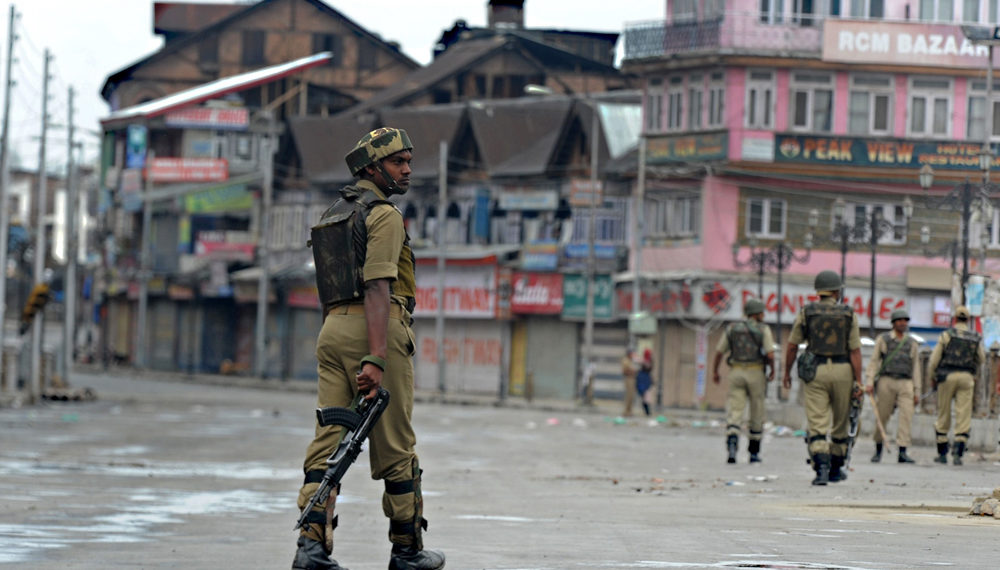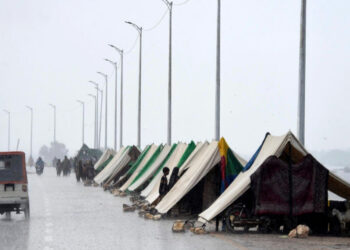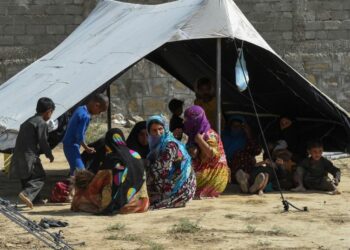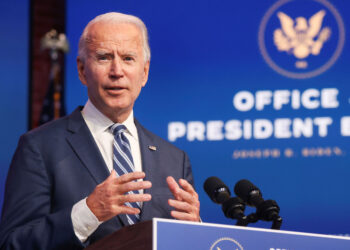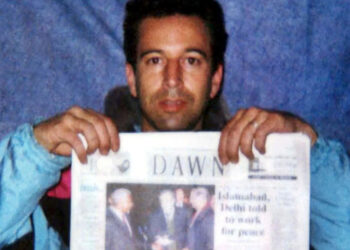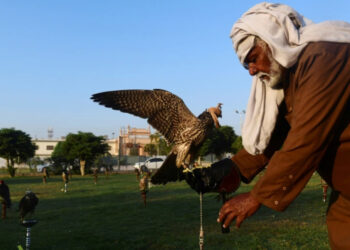Three days before the 2019 parliamentary elections in India to choose a new prime minister, the ruling Hindu nationalist Bharatiya Janata Party (BJP) released its election manifesto in New Delhi.
The BJP’s manifesto, made public on April 8, is named ‘Sankalp Patra’, which, when roughly translated into English, means A determined document.
Besides making many promises regarding national security, the BJP manifesto has also taken a strong position on the status of the disputed Himalayan region of Kashmir. The Indian claim of Kashmir being its “integral part” is contested by both the people of Jammu and Kashmir and the Pakistani state.
Existential Threat
With the aim to fully integrate Indian-administered Kashmir into the Union of India, the manifesto promises to revoke Article 370 and Article 35A of the Indian Constitution, both of which define permanent residents of restive Jammu and Kashmir and grant them special status, right to employment and scholarship.
The BJP’s reference to Article 370 and Article 35A has caused deep anxieties in India-controlled Kashmir. And these anxieties are not unfounded.
Permanent residents of Muslim-majority Kashmir feel they are facing a demographic threat and existential crisis with a right-wing Hindu government at the helm in New Delhi since May 2014 – and there are chances of it returning to power in the 2019 elections.
Article 35A allows the Jammu and Kashmir legislature to define permanent residents of the region.
The disputed Himalayan state is divided by a Line of Control between India and Pakistan since October 1947, administered in parts by the two nuclear powers but claimed in full by both ever since.
Shops and business were closed in #Kashmir's Srinagar amid strike against general elections pic.twitter.com/sYuHtAt1yn
— Press TV 🔻 (@PressTV) April 11, 2019
The Article was inserted through the Indian Constitution (application to the state of Jammu and Kashmir) Order, 1954, which was issued by then Indian President Rajendra Prasad under Article 370, on the advice of independent India’s first Prime Minister Pandit Jawaharlal Nehru-led Union Government.
When the J&K adopted a separate Constitution in 1956, it defined a permanent resident as someone who was a state subject on May 14, 1954, or who has been a resident of the state for 10 years and has lawfully acquired immovable property.
Interestingly, all political groups including pro-independence, pro-Pakistan and even Unionists, who do not challenge Jammu and Kashmir’s contentious and conditional accession with the Union of India, stand united on the issue of safeguarding Article 370 and Article 35A.
Omar Abdullah, former chief minister of Jammu and Kashmir and vice president of region’s oldest political party J&K National Conference (NC), took a dig at Satya Pal Malik, the pro-BJP governor of the volatile region, for his assurances that there was no threat to Article 370 and Article 35A.
“Recently J&K Governor claimed there was no threat to Art 370 & 35-A and that parties like mine were only using them to drum up fear in the elections. I hope his colleagues in the BJP send him a copy of their manifesto,” Abdullah wrote on Twitter.
Jammu and Kashmir’s controversial governor on April 6 said in Srinagar—the summer capital of India-administered Kashmir—that “the mainstream leaders should not blur the lines to start behaving as separatists.”
Speaking to local reporters at Srinagar’s famous Tulip Garden, he acknowledged that Unionist leadership was very important and nothing would work in Kashmir without them but warned “they should not talk like separatists.”
Debating ‘Absurdity’
Be that as it may, both Unionists and pro-independence revolutionaries in India-administered Kashmir seem to be on the same page when it comes to the issue of safeguarding Article 370 and Article 35A until a permanent solution to the dispute is found.
This, according to noted academic and historian Professor Siddiq Wahid, is a development that should be “welcomed.”
“Unionists coming on board and actually showing the same anger that Kashmiris have been showing for so long is, indeed, welcome and should continue. Two, after the elections are over, they have to maintain this pressure and not become soft after being ‘elected’ to power,” Wahid told The Globe Post.
“My thinking on this is very simple. There is overt rejection of the rule of law by the BJP. To debate the BJP’s threats regarding revocation of Article 370 and Article 35A is to basically debate absurdity,” Wahid said, adding that “At the end of the day, we have to get down to brass tacks and accept that they (Hindu nationalist BJP) don’t like us (Kashmiri Muslims); it is a case of plain bigotry.”
In that context, the former vice chancellor of Islamic University of Science and Technology in south Kashmir further argues that “to debate this is to digress. Our concern should be if the BJP indeed revokes Article 370 and 35A, how do we react? It is not fatalistic. Our duty is to keep repeating the truth.”
‘Occupational Force’
Since the past few weeks, Unionists in Kashmir have made safeguarding of Article 370 and Article 35A focus of their election speeches.
Mehbooba Mufti, former chief minister of Jammu and Kashmir and president of People’s Democratic Party, said that “India would turn into an occupational force in Jammu and Kashmir if the Article 370 is removed.”
Recently, a government order in relation to two-day ban per week on civilian movement and vehicular traffic to facilitate movement of Indian Army convoys on Kashmir’s main highway has made people draw parallels with the German occupation of Poland in December 1939 when almost a similar order was passed to prohibit Jews from entering or using pathways, streets and public squares from 9 p.m. to 5 a.m.
Kashmir and its different shades. This is the Naidkhai village, home to NC candidate Akbar Lone. An over enthused supporter dancing at the polling booth. pic.twitter.com/FQw5IOe3sX
— Shuja ul haq (@ShujaUH) April 11, 2019
The ban order, according to the J&K government, was issued keeping in view “the large movement of security forces on the national highway during the parliamentary elections and associated possibility of any fidayeen attack on security forces’ convoys.”
According to this contentious order, there would be a complete ban on civilian traffic on the highway, considered lifeline for Kashmiris, on Sundays and Wednesdays from 4 a.m to 5 p.m until May 31.
Meanwhile, according to Congress Party leader and author Salman Soz, “The BJP rakes up the issue of Article 370 before every election. For the BJP, it is all about how it can draw political mileage from an Article that was embedded in the Indian Constitution by independent India’s founders.”
“When it comes to Kashmir, which has been ravaged by conflict for 30 years now, the BJP repeatedly and unabashedly places its narrow political interests above the long-term national interests,” Soz told The Globe Post.
‘Playing With Fire’
Many believe that the Hindu nationalist BJP has a civilizational idea about Kashmir, Pakistan, and Muslims. A section of Narendra Modi’s supporters see him as a larger-than-life personality who can create an exclusive nation-state for Hindus.
Nasir Aslam Wani, former home minister for state in Jammu and Kashmir and senior leader of region’s oldest political party, National Conference, believes that the BJP seems to be on a mission to “erode whatever shreds that are left of the autonomy” that Jammu and Kashmir once enjoyed until 1953.
“This has always been in their agenda. But they are playing with fire. The Article 370 and Article 35A are a bridge and part of a constitutional compact between Srinagar and Delhi. Revoking this will have ramifications,” Wani told The Globe Post.
Earlier, National Conference leader Omar Abdullah had stirred a political hornet’s nest by renewing his demand to “turn the clock backwards to 1953” when the State of Jammu and Kashmir enjoyed substantial autonomy and New Delhi had control only over defense, currency, and communications.
Abdullah in his recent speech at an election rally in north Kashmir’s Bandipore district on April 1 sparked a debate when he demanded restoration of the constitutional posts and positions like separate Prime Minister (Wazir-e-Azam) and State President (Sadr-e-Riyasat) for Jammu and Kashmir.
Indian-administered Jammu and Kashmir has its separate Constitution and a separate flag. Besides this, the State also had its own Prime Minister and State President until March 30, 1965.
Dr. Sheikh Showkat Hussain, a prominent Kashmiri political analyst and expert in human rights and international law, is of the view that for the BJP talking about revocation of Article 370 and Article 35A is nothing new.
“Right from 1953, the BJP has maintained its position that it wants to fully integrate Jammu and Kashmir with the Union of India. However, the difference this time is that the BJP is in power. Previously, people did not take them seriously,” he said, adding that “even during Atal Bihari Vajpayee’s government no serious attempts were made to erode J&K’s autonomy, but Narendra Modi is trying to make serious inroads, hence people are both skeptical as well as anxious about it.”
‘A Soul of Its Own’
Meanwhile, the Pakistani Prime Minister Imran Khan also tweeted about the BJP’s attempts to “violate constitutional provisions” in India-administered Kashmir.
“When [The Israeli Defense Force Ranks] in Israel & India show a moral bankruptcy in their readiness to annex occupied West Bank & IOK in defiance of international] law, UNSC resolutions & their own Constitution for votes, don’t their ppl [people] feel a sense of outrage & wonder how far they will go simply to win an election?”
During BJP’s rule since May 2014, Modi’s policy on Kashmir has been “militaristic and muscular” with little or no forward movement on dialogue with the stakeholders like pro-independence groups.
Instead, the Modi-led government has launched a massive crackdown against political dissidents by banning socio-political and religious organizations like the Jammu and Kashmir Liberation Front and Jamaat-e-Islami (JeI) in disputed Kashmir.
Nearly 400 members, activists and sympathizers of the JeI have been sent to prison in last two months while India’s Ministry of Home Affairs in two separate orders banned pro-independence JKLF and pro-resolution JeI, both organization advocate peaceful resolution of the Kashmir dispute.
In March 1955, the first prime minister of independent India Jawaharlal Nehru told the Indian Parliament that Kashmir was “a very big question.” He noted, however, that the region is its own place.
“We must always remember Kashmir is not a thing to be bandied about between India-Pakistan. It has a soul of its own; it has an individuality of its own. We cannot, certainly much less than Pakistan, play with it as if it were something in the political game between the two countries,” Nehru said.
“Nothing can be done without the goodwill of the people of Kashmir.”


